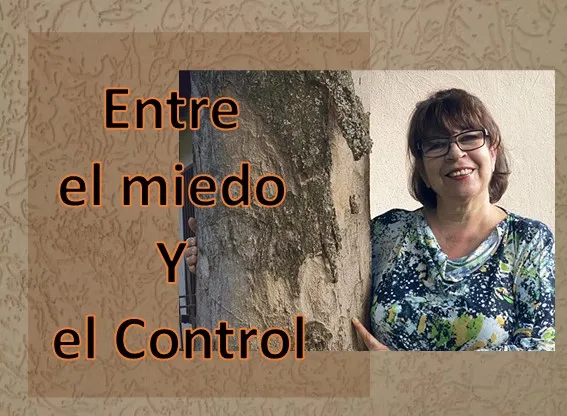
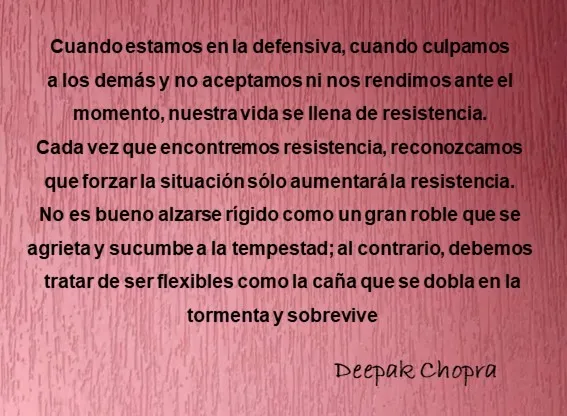
Son palabras de Chopra que en tan pocas líneas nos regala grandes lecciones. Palabras que tomé al azar, me explico, estoy rodeada de mis libros de crecimiento personal, ya los he leído, trabajado, he tomado nota, algunos lo he releído y, sin embargo, estoy segura que no he aprendido de ellos ni la mitad de lo que ofrecen, por eso cada día, en algún momento, abro alguno, leo un párrafo y allí en ese conversar interno voy reflexionando en mi ser, hacer y sentir.
Ayer el libro escogido fue: Las siete leyes espirituales del éxito de Deepak Chopra, el párrafo leído fue ese que les presento al inicio me dije: — ese será mi tema para el post de mañana. Encuentro en este texto cuatro elementos que te comento a continuación:
1.- Estar a la defensiva
Imagina que vas caminando por la calle y escuchas un fuerte frenazo muy cerca de ti, posiblemente tu reacción sea saltar, cubrirte o paralizarte. En cualquiera de las tres repuesta, la emoción que produce la acción es el miedo. El miedo es lo que hace que nos pongamos a la defensiva, esa emoción innata nos ha permitido sobrevivir como humanidad a través del tiempo y en situaciones puntuales, como la del ejemplo, nos puede salvar de un mal momento.
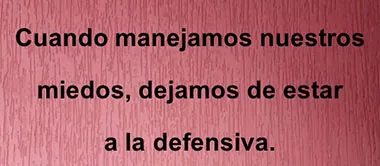
Sin embargo, estar constantemente a la defensiva, es vivir en el miedo en su parte negativa, aquella donde nos paralizamos o si actuamos lo hacemos desde en enfrentamiento, la lucha, el ir contra corriente. Vivirlo en su parte positiva es tomar acción, convertirlo en impulso, eso nos libera, nos lleva a accionar desde el afrontamiento, es decir, con autocontrol, que entre tantos beneficios nos permite tomar decisiones más acertadas y evaluar las situaciones desde un ángulo más positivo.
Concluyendo: Cuando manejamos nuestros miedos dejamos de estar a la defensiva
2.- Culpar a los demás
Esta segunda idea, ¡es dura! Porque cuando culpamos a los demás estamos aceptando que no somos capaces de asumir nuestras responsabilidades y lo más triste es que el poder de nuestras emociones, sentimientos, pasiones se lo entregamos a otra persona.
Cuando yo digo: — ¡María me revienta! (significando con ello que me hace molestar), ¿Es María que me revienta o soy yo que me dejo reventar? María, Pedro, Luisa, y quien sea, va actuar hasta donde yo lo permita. Entonces la responsabilidad no esta en ellos sino en cada uno de nosotros, por lo menos, en lo que respecta a las emociones y sentimientos podemos proclamar y validar nuestra libertad de decisión.
3.- No aceptamos ni nos rendimos ante el momento

Lo maravilloso es que cuando nuestra mente entra en el proceso de aceptación se pone en modo alerta creativa, abre el espacio para las expectativas y comienza a “ver” un mundo de posibilidades. Algo que es muy poco probable que suceda cuando no aceptamos y nos resistimos, que es nuestro cuarto punto.
4.- Crear resistencia

La metáfora entre la rigidez del árbol y la flexibilidad de la caña es oportuna tenerla presente para revisarnos y tal vez preguntarnos: ¿Qué tan flexible soy conmigo, con los demás, con las situaciones? La flexibilidad es asumir la naturaleza cambiante de todo lo existente, el permitirnos, movernos, en el mundo de transformaciones que es la vida.

Between fear and control
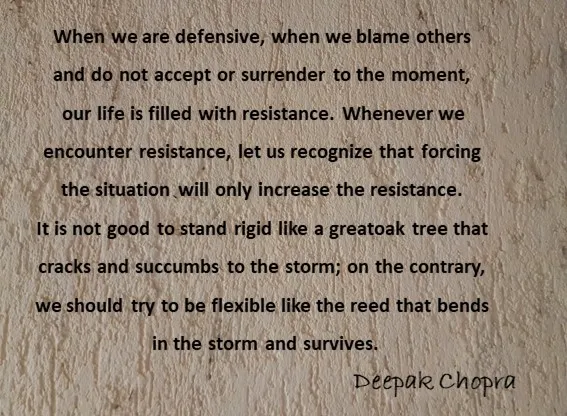
These are words of Chopra who in so few lines gives us great lessons. Words that I took at random, I explain myself, I am surrounded by my personal growth books, I have already read them, worked, I have taken notes, some I have reread and, however, I am sure that I have not learned from them even half of what they offer, so every day, at some point, I open one, I read a paragraph and there, in that inner conversation, I reflect on my being, doing and feeling.
Yesterday the book chosen was: The Seven Spiritual Laws of Success by Deepak Chopra, the paragraph read was the one I present at the beginning and I said to myself: - that will be my topic for tomorrow's post. I find in this text four elements that I comment below:
1.- Being defensive
Imagine you are walking down the street and you hear a loud braking very close to you, possibly your reaction is to jump, cover or freeze. In any of the three responses, the emotion that produces the action is fear.
Fear is what makes us defensive, this innate emotion has allowed us to survive as humanity throughout time and in specific situations, such as the one in the example, it can save us from a bad moment.

However, to be constantly on the defensive, is to live in fear in its negative side, the one where we are paralyzed or if we act we do it from confrontation, struggle, going against the current. To live it in its positive part is to take action, to turn it into impulse, that frees us, leads us to act from the confrontation, that is to say, with self-control, which among so many benefits allows us to make better decisions and to evaluate situations from a more positive angle. Concluding: When we manage our fears we stop being on the defensive.
2.- Blaming others
This second idea is a tough one! Because when we blame others we are accepting that we are not capable of assuming our responsibilities and the saddest thing is that we give the power of our emotions, feelings, passions to someone else.
When I say: - Maria is annoying me! (meaning that she makes me annoyed), is it Maria who is annoying me or is it me who is letting myself be annoyed? Mary, Peter, Louise, and whoever else, will act as far as I allow it. So the responsibility is not in them but in each one of us, at least, as far as emotions and feelings are concerned, we can proclaim and validate our freedom of decision.
3.- We do not accept or surrender to the moment

Sometimes we believe that accepting or surrendering to a situation is weakness. On the contrary, to accept, for example: that something we dreamed of, believed in and put effort into, is not the case, that the matter is not going that way, requires bravery and courage.
The wonderful thing is that when our mind enters the process of acceptance, it goes into creative alert mode, opens the space for expectations and begins to "see" a world of possibilities. Something that is very unlikely to happen when we do not accept and resist, which is our fourth point.
4.- Create resistance

Chopra points out these three actions: being defensive, blaming others and non-acceptance as mechanisms of resistance, of not letting flow, of becoming obstacles for ourselves by wanting to force situations, which is nothing more than a manifestation of that need to control without stopping to think that, perhaps, the only thing we could really have control over is ourselves.
The metaphor between the rigidity of the tree and the flexibility of the reed is opportune to keep in mind in order to review ourselves and perhaps ask ourselves: How flexible am I with myself, with others, with situations? Flexibility is to assume the changing nature of everything that exists, to allow ourselves to move in the world of transformations that is life.
Translated with www.DeepL.com/Translator (free version)
Fuente de imágenes: Archivo personal




MIS REDES SOCIALES




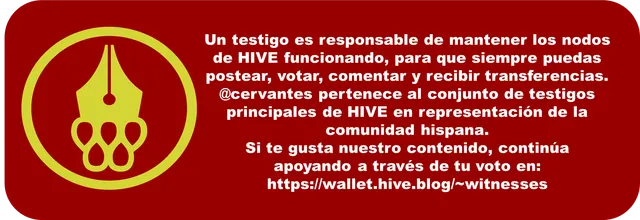
Te invito a apoyar este proyecto como witnes y a formar parte de esta gran comunidad uniéndote a su Discord en el siguiente enlace:
Discord de la comunidad Cervantes




